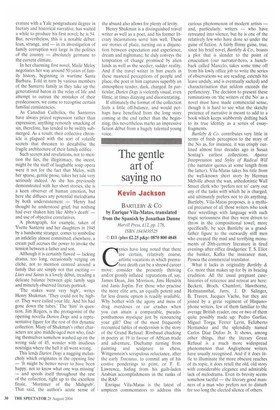The gentle art of saying no
Kevin Jackson
BARTLEBY & CO by Enrique Vila-Matas, translated from the Spanish by Jonathan Dunne Harvill Press, £12, pp. 178, ISBN 1843430525 ill (plus E2.25 p&p) 0870 800 4848 Cynics have long noted that there are certain, relatively coarse, artistic vocations in which premature death can be a shrewd career move: consider the presently thriving and/or grossly inflated reputations of, say, James Dean, Jim Morrison, Jimi Hendrix and Janis Joplin. For those who practise the more elite arts, an equally potent and far less drastic option is readily available. Why bother with the agony and mess of drug overdoses or car crashes when you can attain a comparable, pseudoposthumous mystique just by renouncing your gift? One of the most frequently recounted fables of modernism is the story of the Grand Refusal: Rimbaud chucking in poetry at 19 in favour of African trade and adventure, Duchamp turning from painting and sculpture to chess, Wittgenstein's scrupulous reluctance, after the early Tractatus, to commit any of his costive ponderings to print, or T. E. Lawrence, hiding from his guilt-laden Arabian accomplishments in the ranks of the RAF.
Enrique Vila-Matas is the latest of umpteen commentators to address this
curious phenomenon of modern artists — and, particularly, writers — who have retreated into silence, but he is one of the relatively few who have done so under the guise of fiction. A fairly flimsy guise, true, since his brief novel, Bartleby & Co., boasts a plot that is slender to the point of emaciation (our narrator-hero, a hunchback called Marcelo, takes some time off from his lowly office job to write the series of observations we are reading, extends his leave unduly, and is eventually sacked) and characterisation that seldom exceeds the perfunctory. The decision to present these ruminations on 'the writers of the No' as a novel must have made commercial sense, though it is hard to see what the sketchy pretence of narrative is meant to add to a book which keeps stubbornly drifting back to its true identity as a series of essayfragments.
Bartleby & Co. contributes very little in terms of fresh perception to the story of the No as, for instance, it was crisply outlined almost four decades ago in Susan Sontag's earliest collections, Against Interpretation and Styles of Radical Will (the narrator quotes at some length from the latter). Vila-Matas takes his title from the well-known short story by Herman Melville about the wan, anhedonistic Wall Street clerk who 'prefers not to' carry out any of the tasks with which he is charged, and ultimately prefers not to do anything. Bartleby, Vila-Matas proposes, is a mythical precursor of all those writers who took their wrestlings with language with such tragic seriousness that they were driven to throw in the compositional towel; more specifically, he sees Bartleby as a grandfather figure to the outwardly stiff men who created the mad and terrifying monuments of 20th-century literature in tired evenings after office drudgeries: T. S. Eliot the banker, Kafka the insurance man, Pessoa the commercial translator.
What it lacks in originality Bartleby & Co. more than makes up for by its bracing erudition. All the usual pregnant casehistories of reticence and retreat are here: Beckett, Broch, Chamfort, Hawthorne, Hofmannsthal, Jarry, J. D. Salinger, B. Traven, Jacques Vache, but they are joined by a great regiment of Hispanophone writers, few of them familiar to the average British reader, one or two of them quite possibly made up: Pedro Garfias, Miguel Torga, Ferrer Lerin, Felizberto Hernandez and the splendidly named Carlos Diaz Dufoo Jr. It shows, among other things, that the literary Great Refusal is a much more widespread phenomenon than Anglophone writers have usually recognised. And if it does little to illuminate the more obscure reaches of its topic, it does retell the old, old story with considerable elegance and admirable lack of melodrama. Even its brevity seems somehow tactful — the literary good manners of a man who prefers not to disturb for too long the elected silence of others.


























































 Previous page
Previous page